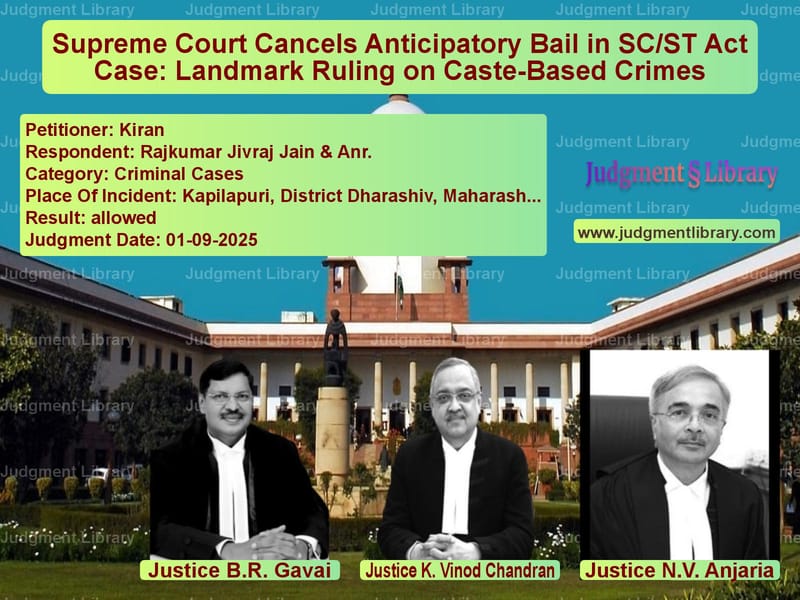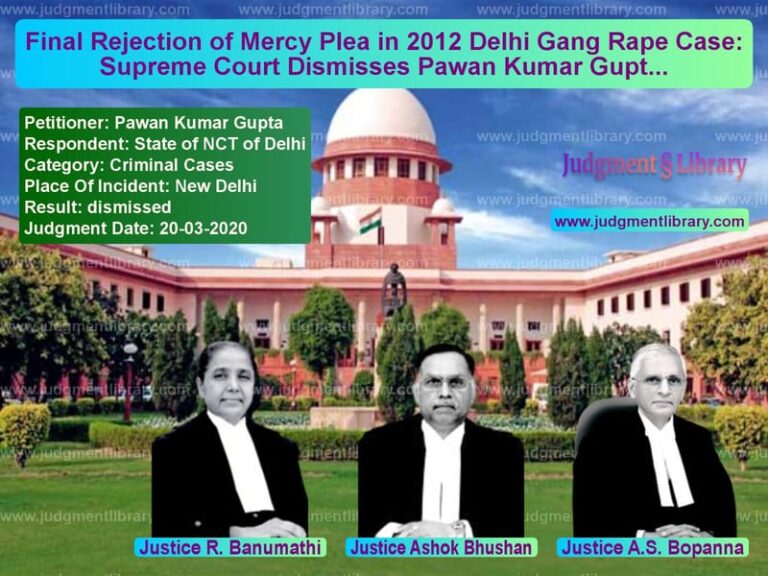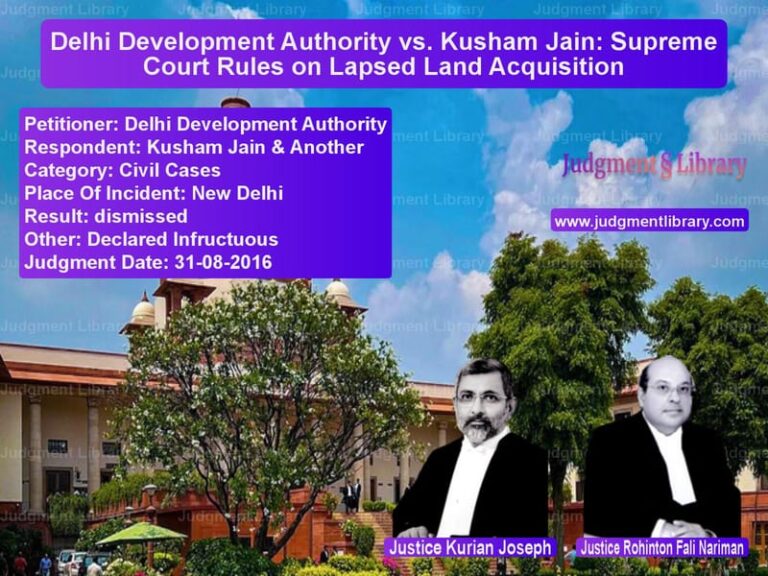Supreme Court Cancels Anticipatory Bail in SC/ST Act Case: Landmark Ruling on Caste-Based Crimes
In a significant judgment that reinforces the protective framework for marginalized communities, the Supreme Court of India recently set aside an anticipatory bail granted to an accused in a case involving offenses under the Scheduled Castes and Scheduled Tribes (Prevention of Atrocities) Act, 1989. The ruling emphasizes the strict statutory bar against anticipatory bail in such cases and underscores the judiciary’s role in safeguarding the rights of SC/ST communities against caste-based insults and intimidation.
The case originated from an incident that occurred on November 25, 2024, in Kapilapuri, District Dharashiv, Maharashtra. The appellant, Kiran, belonging to the Matang Scheduled Caste community, was allegedly attacked by Rajkumar Jain and others after he voted against their preferred candidate in the assembly elections. The FIR detailed how the accused, armed with iron rods and petrol bottles, assaulted Kiran and his family members while using casteist slurs like “Mangtyano” and threatening to burn their house.
The Legal Journey Through Lower Courts
The Additional Sessions Judge, Paranda, had initially rejected the anticipatory bail application of respondent No. 1, Rajkumar Jain, noting specific allegations of caste-based abuse and the presence of independent witnesses. However, the High Court of Judicature at Bombay, Aurangabad Bench, granted anticipatory bail, citing inconsistencies in the prosecution’s story and suggesting political motivations behind the FIR.
Before the Supreme Court, Mr. Amol Nirmalkumar Suryawanshi, learned counsel for the appellant, argued that “the High Court not only misdirected itself in exercise of the discretion to grant bail to respondent No.1, but it plainly overlooked the provisions of Section 18 of the SC/ST Act.” He emphasized that the accused used abusive language referring to the appellant’s caste, which clearly made out offenses under Section 3 of the SC/ST Act. He relied on the decision in Vilas Pandurang Pawar vs. State of Maharashtra to contend that the High Court was not expected to conduct a mini-trial at the bail stage.
On the other hand, the counsel for respondent No. 1 defended the High Court’s order, arguing that “Section 18 of the SC/ST Act did not create an absolute bar to grant anticipatory bail.” He cited Shajan Skaria vs. The State of Kerala & Anr., suggesting that courts must verify whether a prima facie case exists. He claimed the allegations were politically motivated and lacked a casteist color.
Supreme Court’s Analysis of Section 18 Bar
The Supreme Court, comprising Chief Justice B.R. Gavai and Justices K. Vinod Chandran and N.V. Anjaria, delved into the legislative intent behind Section 18 of the SC/ST Act. The Court noted that “Section 18 of the SC/ST Act creates a bar for invoking Section 438 of the Code.” It emphasized that the provision expressly excludes the applicability of anticipatory bail for offenses under the Act, reflecting Parliament’s intent to protect vulnerable communities from intimidation and harassment.
The Court referenced State of M.P. & Anr. vs. Ram Krishna Balothia & Anr., observing: “The exclusion of Section 438 CrPC in connection with offences under the Act has to be viewed in the context of the prevailing social conditions which give rise to such offences, and the apprehension that perpetrators of such atrocities are likely to threaten and intimidate their victims and prevent or obstruct them in the prosecution of these offenders.”
In Vilas Pandurang Pawar vs. State of Maharashtra, the Court elaborated: “Moreover, while considering the application for bail, scope for appreciation of evidence and other material on record is limited. The court is not expected to indulge in critical analysis of the evidence on record.”
Prima Facie Case and Judicial Scrutiny
The Court clarified that while Section 18 imposes a strict bar, there is a narrow exception: “In a given case where on the face of it the offence under Section 3 of the Act is found to have not been made out and that the accusations relating to the commission of such offence are devoid of prima facie merits, the Court has a room to exercise the discretion to grant anticipatory bail.”
However, the Court cautioned against overstepping this limited scope: “In reaching a conclusion as to whether a prima facie offence is made out or not, it would not be permissible for the Court to travel into the evidentiary realm or to consider other materials, nor the Court could advert to conduct a mini trial.”
Application to the Present Case
The Supreme Court found that the FIR disclosed a clear prima facie case of offenses under Sections 3(1)(r) and 3(1)(s) of the SC/ST Act. The accused had used the casteist slur “Mangtyano” in a place within public view, outside the appellant’s house, and had assaulted the complainant with an iron rod. The Court noted: “The use of the word ‘Mangatyano’ was with a clear intention to humiliate the complainant because he belonged to the said Scheduled Caste community.”
The Court also addressed the High Court’s reasoning, stating: “The High Court in proceeding to evaluate the testimony of witnesses and to opine on that basis that there were certain discrepancies, no offence was made out, committed a manifest error.” It emphasized that the High Court had disregarded the statutory bar under Section 18 and engaged in an impermissible mini-trial.
Conclusion and Directions
The Supreme Court allowed the appeal, set aside the High Court’s order, and canceled the anticipatory bail granted to respondent No. 1. The Court clarified that its observations were prima facie and limited to the bail question, ensuring that the trial would proceed independently.
This judgment reaffirms the protective intent of the SC/ST Act and serves as a reminder to courts to adhere to statutory limitations while dealing with anticipatory bail applications in cases involving atrocities against marginalized communities. It underscores the judiciary’s role in upholding the constitutional mandate of social justice and equality.
Petitioner Name: Kiran.Respondent Name: Rajkumar Jivraj Jain & Anr..Judgment By: Justice B.R. Gavai, Justice K. Vinod Chandran, Justice N.V. Anjaria.Place Of Incident: Kapilapuri, District Dharashiv, Maharashtra.Judgment Date: 01-09-2025.Result: allowed.
Don’t miss out on the full details! Download the complete judgment in PDF format below and gain valuable insights instantly!
Download Judgment: kiran-vs-rajkumar-jivraj-jain-supreme-court-of-india-judgment-dated-01-09-2025.pdf
Directly Download Judgment: Directly download this Judgment
See all petitions in SC/ST Act Case
See all petitions in Bail and Anticipatory Bail
See all petitions in Custodial Deaths and Police Misconduct
See all petitions in Judgment by B R Gavai
See all petitions in Judgment by K. Vinod Chandran
See all petitions in Judgment by N.V. Anjaria
See all petitions in allowed
See all petitions in supreme court of India judgments September 2025
See all petitions in 2025 judgments
See all posts in Criminal Cases Category
See all allowed petitions in Criminal Cases Category
See all Dismissed petitions in Criminal Cases Category
See all partially allowed petitions in Criminal Cases Category







